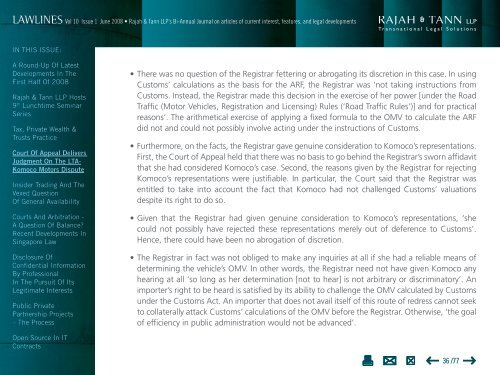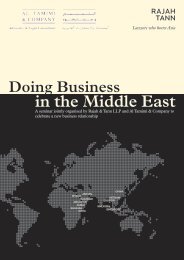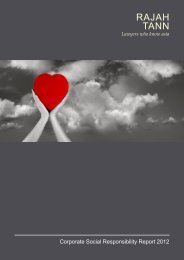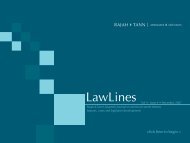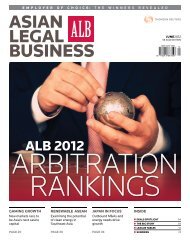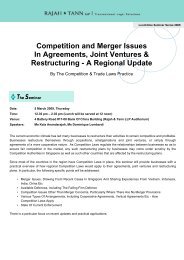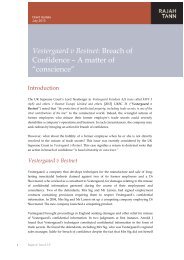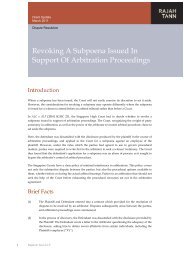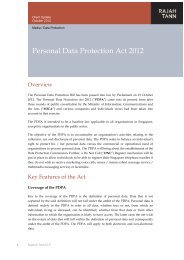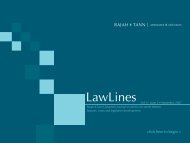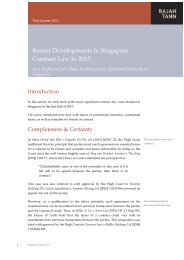Lawlines Vol 10 Issue 1 - eOASIS - Rajah & Tann LLP
Lawlines Vol 10 Issue 1 - eOASIS - Rajah & Tann LLP
Lawlines Vol 10 Issue 1 - eOASIS - Rajah & Tann LLP
Create successful ePaper yourself
Turn your PDF publications into a flip-book with our unique Google optimized e-Paper software.
<strong>Vol</strong> <strong>10</strong> <strong>Issue</strong> 1 June 2008 • <strong>Rajah</strong> & <strong>Tann</strong> <strong>LLP</strong>’s Bi-Annual Journal on articles of current interest, features, and legal developmentsIN THIS ISSUE:A Round-Up Of LatestDevelopments In TheFirst Half Of 2008<strong>Rajah</strong> & <strong>Tann</strong> <strong>LLP</strong> Hosts9 th Lunchtime SeminarSeriesTax, Private Wealth &Trusts PracticeCourt Of Appeal DeliversJudgment On The LTA-Komoco Motors DisputeInsider Trading And TheVexed QuestionOf General AvailabilityCourts And Arbitration -A Question Of Balance?Recent Developments InSingapore LawDisclosure OfConfidential InformationBy ProfessionalIn The Pursuit Of ItsLegitimate InterestsPublic PrivatePartnership Projects– The Process• There was no question of the Registrar fettering or abrogating its discretion in this case. In usingCustoms’ calculations as the basis for the ARF, the Registrar was ‘not taking instructions fromCustoms. Instead, the Registrar made this decision in the exercise of her power [under the RoadTraffic (Motor Vehicles, Registration and Licensing) Rules (‘Road Traffic Rules’)] and for practicalreasons’. The arithmetical exercise of applying a fixed formula to the OMV to calculate the ARFdid not and could not possibly involve acting under the instructions of Customs.• Furthermore, on the facts, the Registrar gave genuine consideration to Komoco’s representations.First, the Court of Appeal held that there was no basis to go behind the Registrar’s sworn affidavitthat she had considered Komoco’s case. Second, the reasons given by the Registrar for rejectingKomoco’s representations were justifiable. In particular, the Court said that the Registrar wasentitled to take into account the fact that Komoco had not challenged Customs’ valuationsdespite its right to do so.• Given that the Registrar had given genuine consideration to Komoco’s representations, ‘shecould not possibly have rejected these representations merely out of deference to Customs’.Hence, there could have been no abrogation of discretion.• The Registrar in fact was not obliged to make any inquiries at all if she had a reliable means ofdetermining the vehicle’s OMV. In other words, the Registrar need not have given Komoco anyhearing at all ‘so long as her determination [not to hear] is not arbitrary or discriminatory’. Animporter’s right to be heard is satisfied by its ability to challenge the OMV calculated by Customsunder the Customs Act. An importer that does not avail itself of this route of redress cannot seekto collaterally attack Customs’ calculations of the OMV before the Registrar. Otherwise, ‘the goalof efficiency in public administration would not be advanced’.Open Source In ITContracts36 /77


